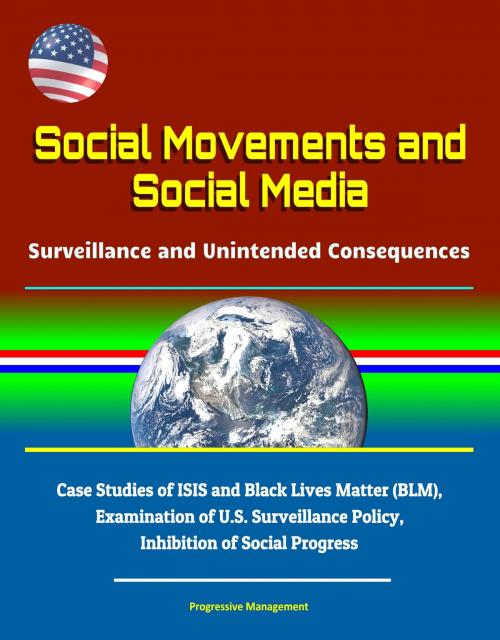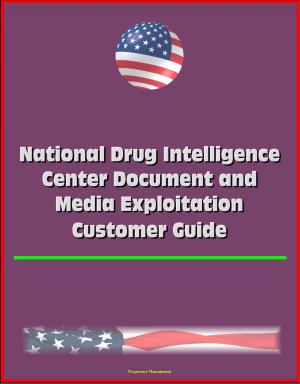Social Movements and Social Media: Surveillance and Unintended Consequences - Case Studies of ISIS and Black Lives Matter (BLM), Examination of U.S. Surveillance Policy, Inhibition of Social Progress
Nonfiction, Computers, Social & Cultural Studies, Political Science| Author: | Progressive Management | ISBN: | 9780463660805 |
| Publisher: | Progressive Management | Publication: | June 25, 2018 |
| Imprint: | Smashwords Edition | Language: | English |
| Author: | Progressive Management |
| ISBN: | 9780463660805 |
| Publisher: | Progressive Management |
| Publication: | June 25, 2018 |
| Imprint: | Smashwords Edition |
| Language: | English |
This important December 2017 report has been professionally converted for accurate flowing-text e-book format reproduction.
How does the use of social media by radical and non-radical social movements differ, and what are the implications of externally focused national security anti-terrorist strategies upon domestic reformist movements? This thesis uses a comparative case study to examine the use of social media by ISIS and Black Lives Matter to explore how organizational and political objectives shape social media objectives, social media strategies, and the ways in which movements interact with civil society. Both movements use social media to communicate with governments, populations, and news organizations, but their purposes differ; while one seeks recruits to overthrow or significantly alter existing institutional structures, the other is seeking sympathizers within institutional structures.
This thesis also examines U.S. surveillance policy to determine whether or not policy designed for radical groups puts reformist movements at risk. Current policy does not pose a threat to domestic, reformist movements as it did in the past. However, government agencies are consumers of unregulated private sector surveillance services that groups within the domestic population may perceive as repressive or unlawful. The state risks inhibiting social progress and, paradoxically, radicalizing reformist groups through surveillance as it may be perceived as a form of repression.
I. SOCIAL MOVEMENTS AND SOCIAL MEDIA: SURVEILLANCE * AND UNINTENDED CONSEQUENCES * A. BACKGROUND * B. MAJOR RESEARCH QUESTIONS * C. SIGNIFICANCE OF THE RESEARCH QUESTION * D. LITERATURE REVIEW * 1. Social Movements: Definitions and Characteristics * 2. Revolutionary Movements * 3. Why Social Movements Radicalize * 4. Relationship between Media and Social Movements * 5. Social Movements and National Security * E. POTENTIAL EXPLANATIONS AND HYPOTHESES * F. RESEARCH DESIGN * II. CURRENT ELECTRONIC SURVEILLANCE POLICY: IS THE PUBLIC AT RISK? * A. THE HISTORY OF INTELLIGENCE POLICY IN THE UNITED STATES * B. DOMESTIC U.S. INTELLIGENCE POLICY TODAY * C. INTELLIGENCE, SURVEILLANCE, AND SOCIAL MEDIA * D. SUMMARY * III. ISIS: A SOCIAL MEDIA STRATEGY FOR CHAOS * A. THE ORIGINS OF ISIS * 1. The Organizational Evolution of ISIS * 2. The U.S. Occupation of Iraq * B. THE POLITICAL OBJECTIVES OF ISIS * C. SOCIAL MEDIA OBJECTIVES OF ISIS * D. ISIS AND SOCIAL MEDIA * 1. Intimidation of Adversaries * 2. A Call to Action * E. SUMMARY * IV. BLACK LIVES MATTER: SOCIAL REFORMATION ON SOCIAL MEDIA * A. THE ORIGINS OF BLACK LIVES MATTER * B. THE ORGANIZATIONAL STRUCTURE OF BLACK LIVES MATTER * C. THE POLITICAL OBJECTIVES OF BLACK LIVES MATTER * D. SOCIAL MEDIA OBJECTIVES OF BLACK LIVES MATTER * 1. How Black Lives Matter Propagates its Message on Social Media * 2. Coordinating Mass Mobilization * E. SUMMARY * V. CONCLUSION * A. SUMMARY OF RESEARCH * B. FINDINGS * C. IMPLICATIONS OF RESEARCH * D. RECOMMENDATIONS
This important December 2017 report has been professionally converted for accurate flowing-text e-book format reproduction.
How does the use of social media by radical and non-radical social movements differ, and what are the implications of externally focused national security anti-terrorist strategies upon domestic reformist movements? This thesis uses a comparative case study to examine the use of social media by ISIS and Black Lives Matter to explore how organizational and political objectives shape social media objectives, social media strategies, and the ways in which movements interact with civil society. Both movements use social media to communicate with governments, populations, and news organizations, but their purposes differ; while one seeks recruits to overthrow or significantly alter existing institutional structures, the other is seeking sympathizers within institutional structures.
This thesis also examines U.S. surveillance policy to determine whether or not policy designed for radical groups puts reformist movements at risk. Current policy does not pose a threat to domestic, reformist movements as it did in the past. However, government agencies are consumers of unregulated private sector surveillance services that groups within the domestic population may perceive as repressive or unlawful. The state risks inhibiting social progress and, paradoxically, radicalizing reformist groups through surveillance as it may be perceived as a form of repression.
I. SOCIAL MOVEMENTS AND SOCIAL MEDIA: SURVEILLANCE * AND UNINTENDED CONSEQUENCES * A. BACKGROUND * B. MAJOR RESEARCH QUESTIONS * C. SIGNIFICANCE OF THE RESEARCH QUESTION * D. LITERATURE REVIEW * 1. Social Movements: Definitions and Characteristics * 2. Revolutionary Movements * 3. Why Social Movements Radicalize * 4. Relationship between Media and Social Movements * 5. Social Movements and National Security * E. POTENTIAL EXPLANATIONS AND HYPOTHESES * F. RESEARCH DESIGN * II. CURRENT ELECTRONIC SURVEILLANCE POLICY: IS THE PUBLIC AT RISK? * A. THE HISTORY OF INTELLIGENCE POLICY IN THE UNITED STATES * B. DOMESTIC U.S. INTELLIGENCE POLICY TODAY * C. INTELLIGENCE, SURVEILLANCE, AND SOCIAL MEDIA * D. SUMMARY * III. ISIS: A SOCIAL MEDIA STRATEGY FOR CHAOS * A. THE ORIGINS OF ISIS * 1. The Organizational Evolution of ISIS * 2. The U.S. Occupation of Iraq * B. THE POLITICAL OBJECTIVES OF ISIS * C. SOCIAL MEDIA OBJECTIVES OF ISIS * D. ISIS AND SOCIAL MEDIA * 1. Intimidation of Adversaries * 2. A Call to Action * E. SUMMARY * IV. BLACK LIVES MATTER: SOCIAL REFORMATION ON SOCIAL MEDIA * A. THE ORIGINS OF BLACK LIVES MATTER * B. THE ORGANIZATIONAL STRUCTURE OF BLACK LIVES MATTER * C. THE POLITICAL OBJECTIVES OF BLACK LIVES MATTER * D. SOCIAL MEDIA OBJECTIVES OF BLACK LIVES MATTER * 1. How Black Lives Matter Propagates its Message on Social Media * 2. Coordinating Mass Mobilization * E. SUMMARY * V. CONCLUSION * A. SUMMARY OF RESEARCH * B. FINDINGS * C. IMPLICATIONS OF RESEARCH * D. RECOMMENDATIONS















